Food Safety Management Report: Strategies for Sushi Testu Restaurant
VerifiedAdded on 2021/02/19
|18
|4424
|38
Report
AI Summary
This report provides a detailed analysis of food safety management practices within the context of Sushi Testu, a Japanese restaurant in London. It begins with an overview of food safety and its importance, followed by an examination of food supply approaches, principles of procurement, and supply chain strategies. The report explores analytical tools used in the food service industry, such as operational efficiency and market basket analysis, and then delves into various management practices and tools, including strategic planning and TQM. Recommendations are made to support these practices and improve business operations. The report also investigates ethical practices, their impact on the business, and provides an analysis of ethical considerations in the food industry. Finally, it offers suggestions for improvement and alternative management strategies to resolve issues and enhance productivity and performance, concluding with an overview of the implementation and monitoring of a food safety plan.
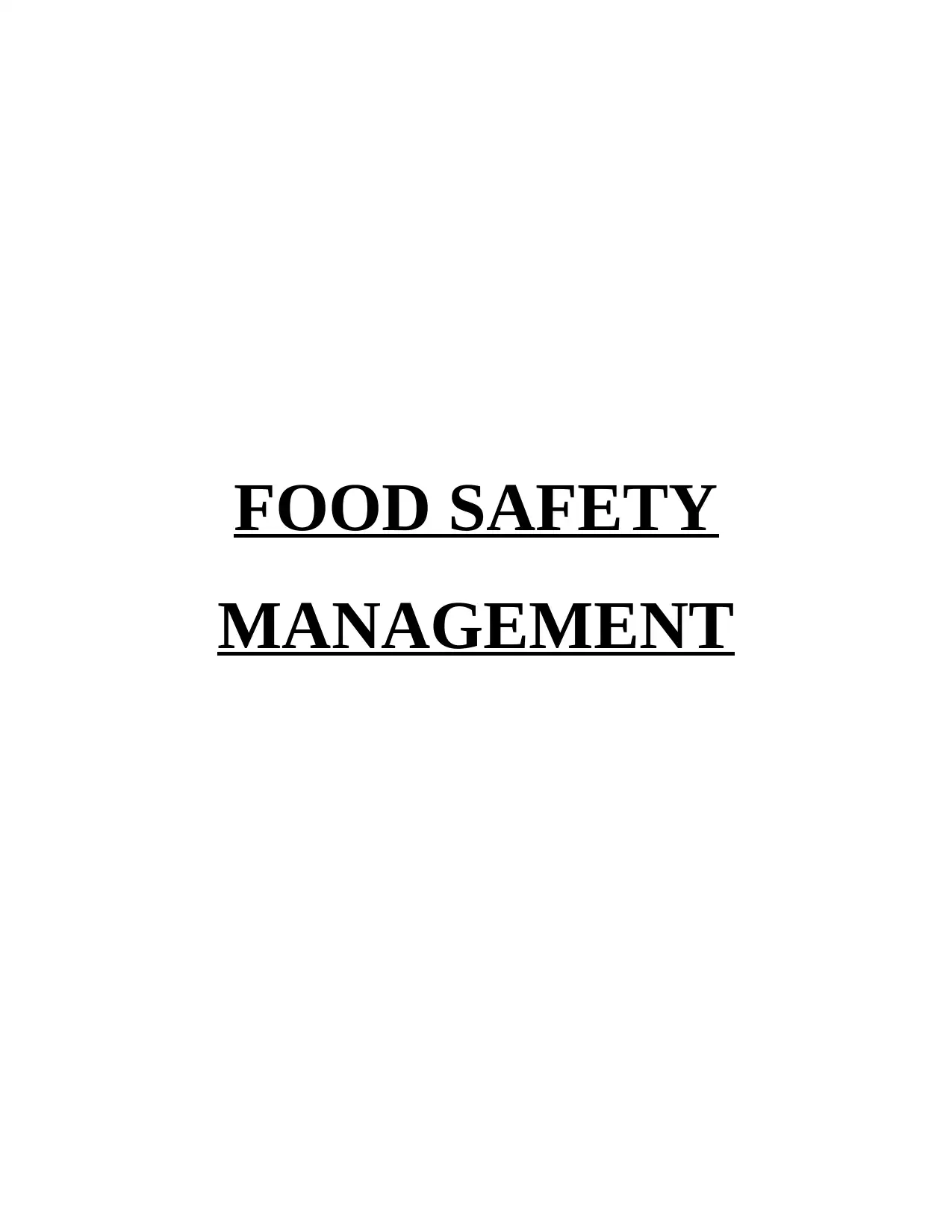
FOOD SAFETY
MANAGEMENT
MANAGEMENT
Paraphrase This Document
Need a fresh take? Get an instant paraphrase of this document with our AI Paraphraser
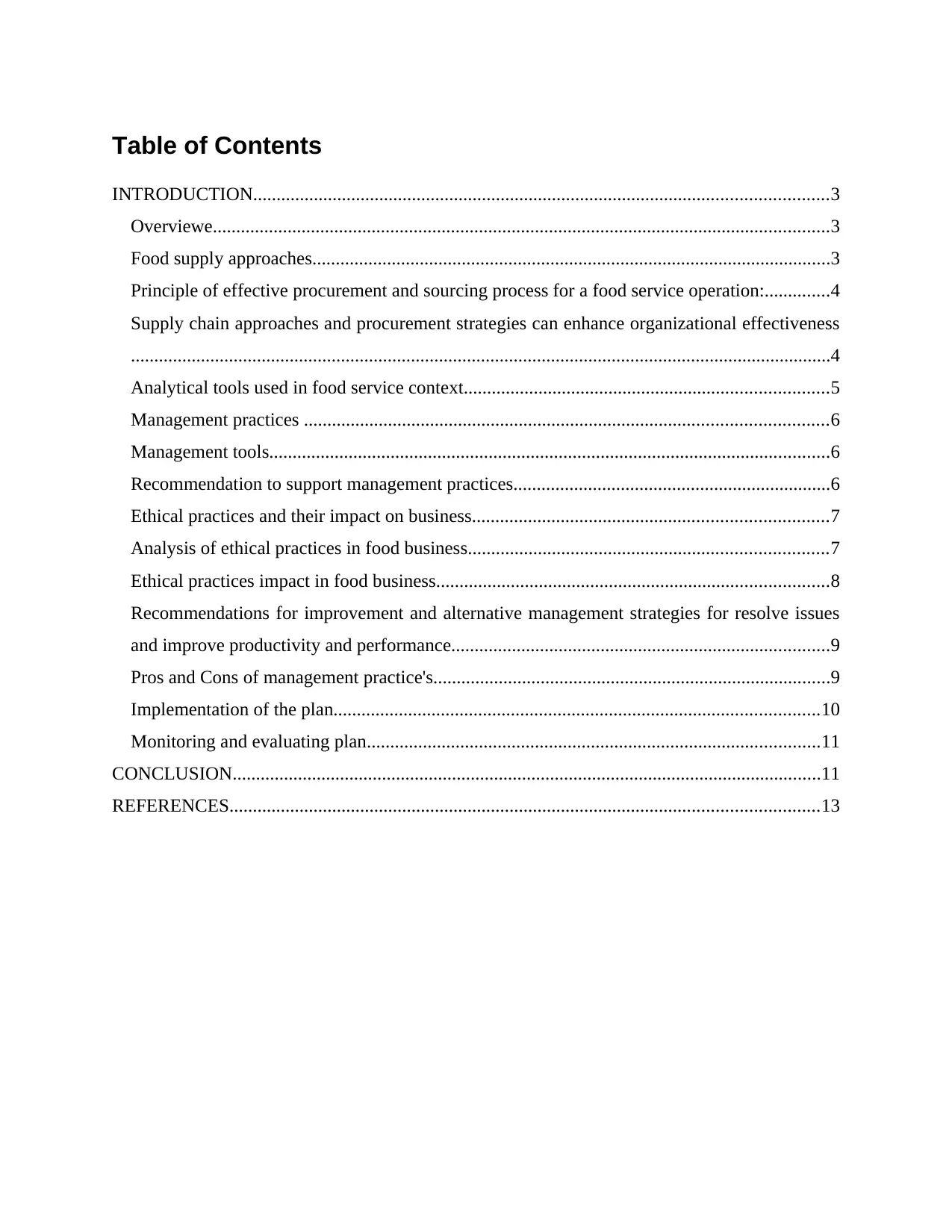
Table of Contents
INTRODUCTION...........................................................................................................................3
Overviewe....................................................................................................................................3
Food supply approaches...............................................................................................................3
Principle of effective procurement and sourcing process for a food service operation:..............4
Supply chain approaches and procurement strategies can enhance organizational effectiveness
......................................................................................................................................................4
Analytical tools used in food service context..............................................................................5
Management practices ................................................................................................................6
Management tools........................................................................................................................6
Recommendation to support management practices....................................................................6
Ethical practices and their impact on business............................................................................7
Analysis of ethical practices in food business.............................................................................7
Ethical practices impact in food business....................................................................................8
Recommendations for improvement and alternative management strategies for resolve issues
and improve productivity and performance.................................................................................9
Pros and Cons of management practice's.....................................................................................9
Implementation of the plan........................................................................................................10
Monitoring and evaluating plan.................................................................................................11
CONCLUSION..............................................................................................................................11
REFERENCES..............................................................................................................................13
INTRODUCTION...........................................................................................................................3
Overviewe....................................................................................................................................3
Food supply approaches...............................................................................................................3
Principle of effective procurement and sourcing process for a food service operation:..............4
Supply chain approaches and procurement strategies can enhance organizational effectiveness
......................................................................................................................................................4
Analytical tools used in food service context..............................................................................5
Management practices ................................................................................................................6
Management tools........................................................................................................................6
Recommendation to support management practices....................................................................6
Ethical practices and their impact on business............................................................................7
Analysis of ethical practices in food business.............................................................................7
Ethical practices impact in food business....................................................................................8
Recommendations for improvement and alternative management strategies for resolve issues
and improve productivity and performance.................................................................................9
Pros and Cons of management practice's.....................................................................................9
Implementation of the plan........................................................................................................10
Monitoring and evaluating plan.................................................................................................11
CONCLUSION..............................................................................................................................11
REFERENCES..............................................................................................................................13
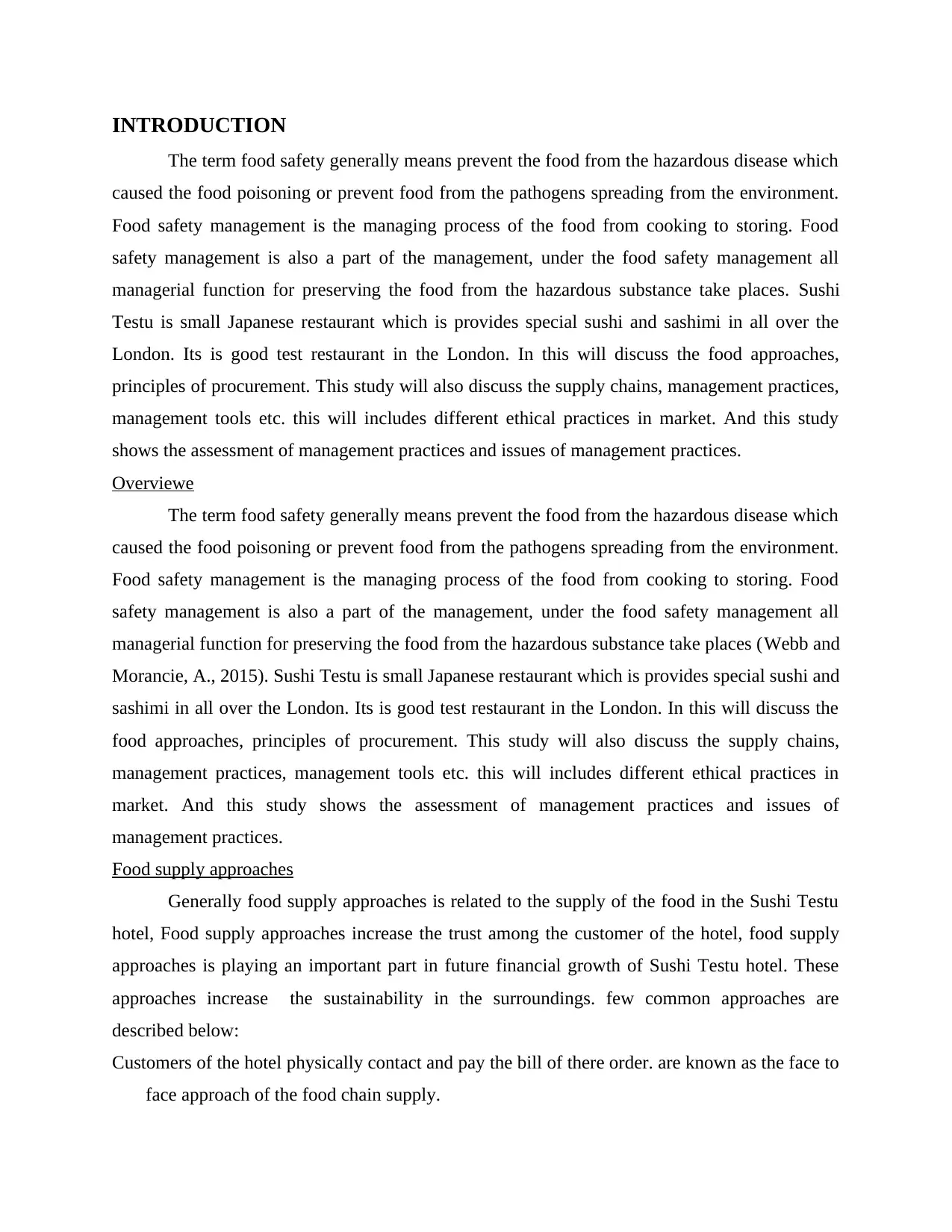
INTRODUCTION
The term food safety generally means prevent the food from the hazardous disease which
caused the food poisoning or prevent food from the pathogens spreading from the environment.
Food safety management is the managing process of the food from cooking to storing. Food
safety management is also a part of the management, under the food safety management all
managerial function for preserving the food from the hazardous substance take places. Sushi
Testu is small Japanese restaurant which is provides special sushi and sashimi in all over the
London. Its is good test restaurant in the London. In this will discuss the food approaches,
principles of procurement. This study will also discuss the supply chains, management practices,
management tools etc. this will includes different ethical practices in market. And this study
shows the assessment of management practices and issues of management practices.
Overviewe
The term food safety generally means prevent the food from the hazardous disease which
caused the food poisoning or prevent food from the pathogens spreading from the environment.
Food safety management is the managing process of the food from cooking to storing. Food
safety management is also a part of the management, under the food safety management all
managerial function for preserving the food from the hazardous substance take places (Webb and
Morancie, A., 2015). Sushi Testu is small Japanese restaurant which is provides special sushi and
sashimi in all over the London. Its is good test restaurant in the London. In this will discuss the
food approaches, principles of procurement. This study will also discuss the supply chains,
management practices, management tools etc. this will includes different ethical practices in
market. And this study shows the assessment of management practices and issues of
management practices.
Food supply approaches
Generally food supply approaches is related to the supply of the food in the Sushi Testu
hotel, Food supply approaches increase the trust among the customer of the hotel, food supply
approaches is playing an important part in future financial growth of Sushi Testu hotel. These
approaches increase the sustainability in the surroundings. few common approaches are
described below:
Customers of the hotel physically contact and pay the bill of there order. are known as the face to
face approach of the food chain supply.
The term food safety generally means prevent the food from the hazardous disease which
caused the food poisoning or prevent food from the pathogens spreading from the environment.
Food safety management is the managing process of the food from cooking to storing. Food
safety management is also a part of the management, under the food safety management all
managerial function for preserving the food from the hazardous substance take places. Sushi
Testu is small Japanese restaurant which is provides special sushi and sashimi in all over the
London. Its is good test restaurant in the London. In this will discuss the food approaches,
principles of procurement. This study will also discuss the supply chains, management practices,
management tools etc. this will includes different ethical practices in market. And this study
shows the assessment of management practices and issues of management practices.
Overviewe
The term food safety generally means prevent the food from the hazardous disease which
caused the food poisoning or prevent food from the pathogens spreading from the environment.
Food safety management is the managing process of the food from cooking to storing. Food
safety management is also a part of the management, under the food safety management all
managerial function for preserving the food from the hazardous substance take places (Webb and
Morancie, A., 2015). Sushi Testu is small Japanese restaurant which is provides special sushi and
sashimi in all over the London. Its is good test restaurant in the London. In this will discuss the
food approaches, principles of procurement. This study will also discuss the supply chains,
management practices, management tools etc. this will includes different ethical practices in
market. And this study shows the assessment of management practices and issues of
management practices.
Food supply approaches
Generally food supply approaches is related to the supply of the food in the Sushi Testu
hotel, Food supply approaches increase the trust among the customer of the hotel, food supply
approaches is playing an important part in future financial growth of Sushi Testu hotel. These
approaches increase the sustainability in the surroundings. few common approaches are
described below:
Customers of the hotel physically contact and pay the bill of there order. are known as the face to
face approach of the food chain supply.
⊘ This is a preview!⊘
Do you want full access?
Subscribe today to unlock all pages.

Trusted by 1+ million students worldwide
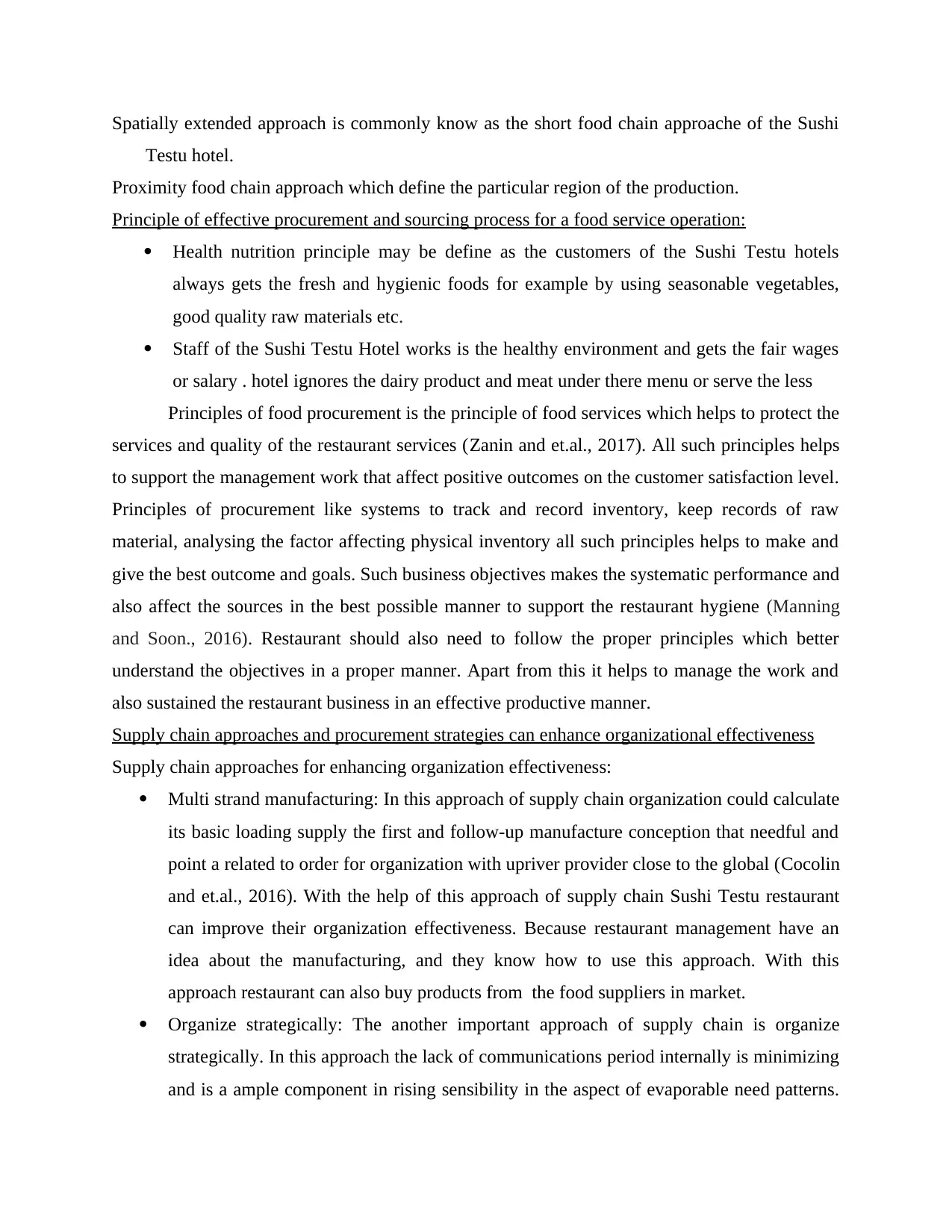
Spatially extended approach is commonly know as the short food chain approache of the Sushi
Testu hotel.
Proximity food chain approach which define the particular region of the production.
Principle of effective procurement and sourcing process for a food service operation:
Health nutrition principle may be define as the customers of the Sushi Testu hotels
always gets the fresh and hygienic foods for example by using seasonable vegetables,
good quality raw materials etc.
Staff of the Sushi Testu Hotel works is the healthy environment and gets the fair wages
or salary . hotel ignores the dairy product and meat under there menu or serve the less
Principles of food procurement is the principle of food services which helps to protect the
services and quality of the restaurant services (Zanin and et.al., 2017). All such principles helps
to support the management work that affect positive outcomes on the customer satisfaction level.
Principles of procurement like systems to track and record inventory, keep records of raw
material, analysing the factor affecting physical inventory all such principles helps to make and
give the best outcome and goals. Such business objectives makes the systematic performance and
also affect the sources in the best possible manner to support the restaurant hygiene (Manning
and Soon., 2016). Restaurant should also need to follow the proper principles which better
understand the objectives in a proper manner. Apart from this it helps to manage the work and
also sustained the restaurant business in an effective productive manner.
Supply chain approaches and procurement strategies can enhance organizational effectiveness
Supply chain approaches for enhancing organization effectiveness:
Multi strand manufacturing: In this approach of supply chain organization could calculate
its basic loading supply the first and follow-up manufacture conception that needful and
point a related to order for organization with upriver provider close to the global (Cocolin
and et.al., 2016). With the help of this approach of supply chain Sushi Testu restaurant
can improve their organization effectiveness. Because restaurant management have an
idea about the manufacturing, and they know how to use this approach. With this
approach restaurant can also buy products from the food suppliers in market.
Organize strategically: The another important approach of supply chain is organize
strategically. In this approach the lack of communications period internally is minimizing
and is a ample component in rising sensibility in the aspect of evaporable need patterns.
Testu hotel.
Proximity food chain approach which define the particular region of the production.
Principle of effective procurement and sourcing process for a food service operation:
Health nutrition principle may be define as the customers of the Sushi Testu hotels
always gets the fresh and hygienic foods for example by using seasonable vegetables,
good quality raw materials etc.
Staff of the Sushi Testu Hotel works is the healthy environment and gets the fair wages
or salary . hotel ignores the dairy product and meat under there menu or serve the less
Principles of food procurement is the principle of food services which helps to protect the
services and quality of the restaurant services (Zanin and et.al., 2017). All such principles helps
to support the management work that affect positive outcomes on the customer satisfaction level.
Principles of procurement like systems to track and record inventory, keep records of raw
material, analysing the factor affecting physical inventory all such principles helps to make and
give the best outcome and goals. Such business objectives makes the systematic performance and
also affect the sources in the best possible manner to support the restaurant hygiene (Manning
and Soon., 2016). Restaurant should also need to follow the proper principles which better
understand the objectives in a proper manner. Apart from this it helps to manage the work and
also sustained the restaurant business in an effective productive manner.
Supply chain approaches and procurement strategies can enhance organizational effectiveness
Supply chain approaches for enhancing organization effectiveness:
Multi strand manufacturing: In this approach of supply chain organization could calculate
its basic loading supply the first and follow-up manufacture conception that needful and
point a related to order for organization with upriver provider close to the global (Cocolin
and et.al., 2016). With the help of this approach of supply chain Sushi Testu restaurant
can improve their organization effectiveness. Because restaurant management have an
idea about the manufacturing, and they know how to use this approach. With this
approach restaurant can also buy products from the food suppliers in market.
Organize strategically: The another important approach of supply chain is organize
strategically. In this approach the lack of communications period internally is minimizing
and is a ample component in rising sensibility in the aspect of evaporable need patterns.
Paraphrase This Document
Need a fresh take? Get an instant paraphrase of this document with our AI Paraphraser
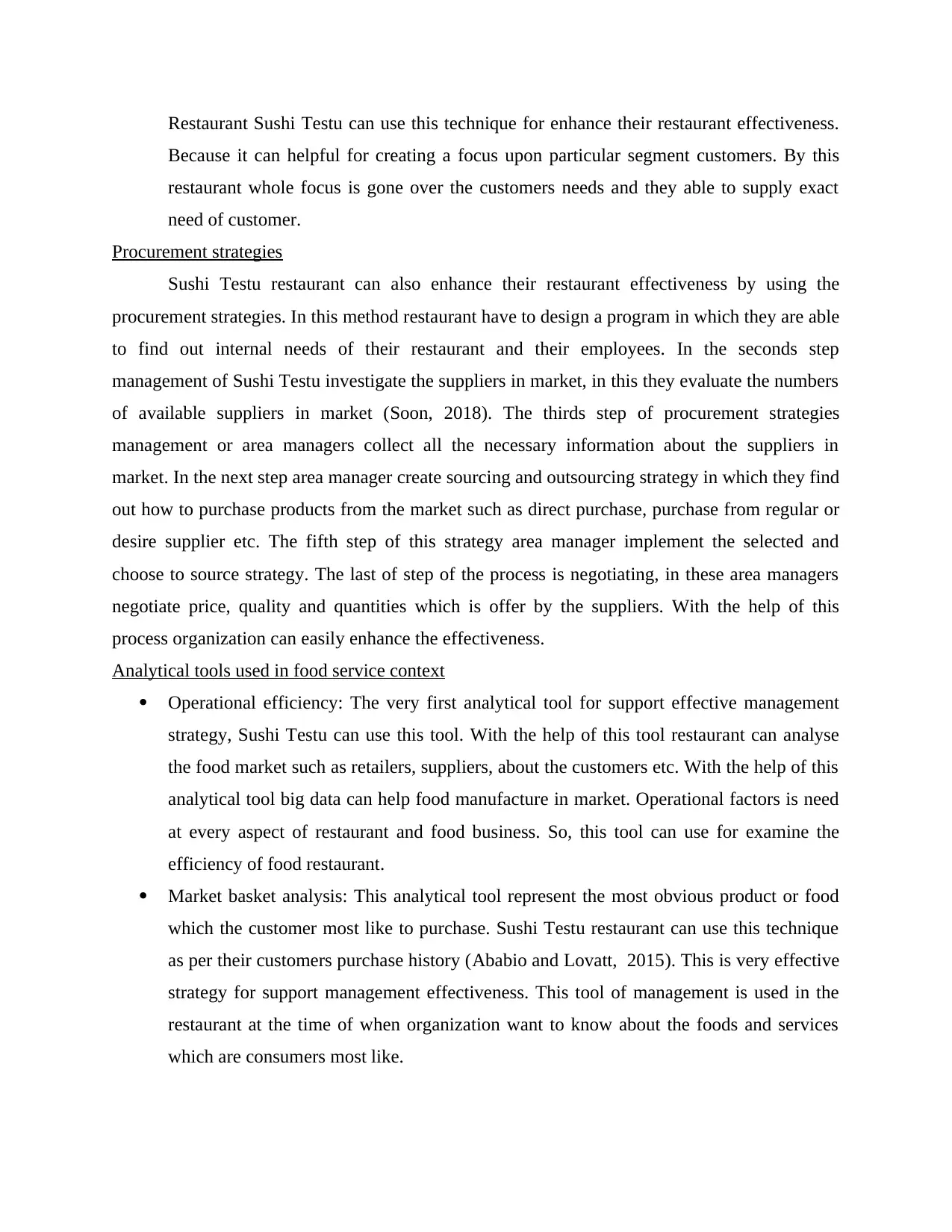
Restaurant Sushi Testu can use this technique for enhance their restaurant effectiveness.
Because it can helpful for creating a focus upon particular segment customers. By this
restaurant whole focus is gone over the customers needs and they able to supply exact
need of customer.
Procurement strategies
Sushi Testu restaurant can also enhance their restaurant effectiveness by using the
procurement strategies. In this method restaurant have to design a program in which they are able
to find out internal needs of their restaurant and their employees. In the seconds step
management of Sushi Testu investigate the suppliers in market, in this they evaluate the numbers
of available suppliers in market (Soon, 2018). The thirds step of procurement strategies
management or area managers collect all the necessary information about the suppliers in
market. In the next step area manager create sourcing and outsourcing strategy in which they find
out how to purchase products from the market such as direct purchase, purchase from regular or
desire supplier etc. The fifth step of this strategy area manager implement the selected and
choose to source strategy. The last of step of the process is negotiating, in these area managers
negotiate price, quality and quantities which is offer by the suppliers. With the help of this
process organization can easily enhance the effectiveness.
Analytical tools used in food service context
Operational efficiency: The very first analytical tool for support effective management
strategy, Sushi Testu can use this tool. With the help of this tool restaurant can analyse
the food market such as retailers, suppliers, about the customers etc. With the help of this
analytical tool big data can help food manufacture in market. Operational factors is need
at every aspect of restaurant and food business. So, this tool can use for examine the
efficiency of food restaurant.
Market basket analysis: This analytical tool represent the most obvious product or food
which the customer most like to purchase. Sushi Testu restaurant can use this technique
as per their customers purchase history (Ababio and Lovatt, 2015). This is very effective
strategy for support management effectiveness. This tool of management is used in the
restaurant at the time of when organization want to know about the foods and services
which are consumers most like.
Because it can helpful for creating a focus upon particular segment customers. By this
restaurant whole focus is gone over the customers needs and they able to supply exact
need of customer.
Procurement strategies
Sushi Testu restaurant can also enhance their restaurant effectiveness by using the
procurement strategies. In this method restaurant have to design a program in which they are able
to find out internal needs of their restaurant and their employees. In the seconds step
management of Sushi Testu investigate the suppliers in market, in this they evaluate the numbers
of available suppliers in market (Soon, 2018). The thirds step of procurement strategies
management or area managers collect all the necessary information about the suppliers in
market. In the next step area manager create sourcing and outsourcing strategy in which they find
out how to purchase products from the market such as direct purchase, purchase from regular or
desire supplier etc. The fifth step of this strategy area manager implement the selected and
choose to source strategy. The last of step of the process is negotiating, in these area managers
negotiate price, quality and quantities which is offer by the suppliers. With the help of this
process organization can easily enhance the effectiveness.
Analytical tools used in food service context
Operational efficiency: The very first analytical tool for support effective management
strategy, Sushi Testu can use this tool. With the help of this tool restaurant can analyse
the food market such as retailers, suppliers, about the customers etc. With the help of this
analytical tool big data can help food manufacture in market. Operational factors is need
at every aspect of restaurant and food business. So, this tool can use for examine the
efficiency of food restaurant.
Market basket analysis: This analytical tool represent the most obvious product or food
which the customer most like to purchase. Sushi Testu restaurant can use this technique
as per their customers purchase history (Ababio and Lovatt, 2015). This is very effective
strategy for support management effectiveness. This tool of management is used in the
restaurant at the time of when organization want to know about the foods and services
which are consumers most like.
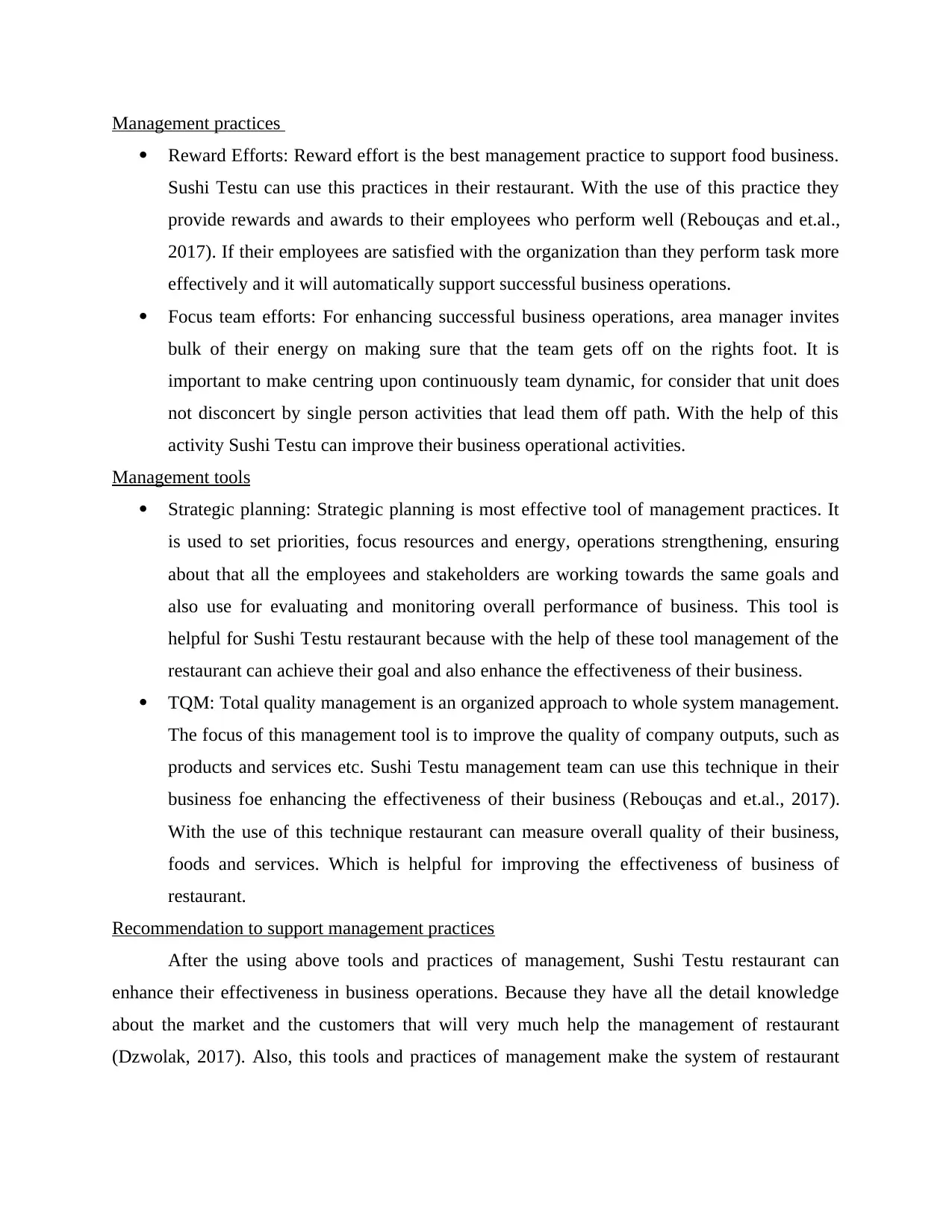
Management practices
Reward Efforts: Reward effort is the best management practice to support food business.
Sushi Testu can use this practices in their restaurant. With the use of this practice they
provide rewards and awards to their employees who perform well (Rebouças and et.al.,
2017). If their employees are satisfied with the organization than they perform task more
effectively and it will automatically support successful business operations.
Focus team efforts: For enhancing successful business operations, area manager invites
bulk of their energy on making sure that the team gets off on the rights foot. It is
important to make centring upon continuously team dynamic, for consider that unit does
not disconcert by single person activities that lead them off path. With the help of this
activity Sushi Testu can improve their business operational activities.
Management tools
Strategic planning: Strategic planning is most effective tool of management practices. It
is used to set priorities, focus resources and energy, operations strengthening, ensuring
about that all the employees and stakeholders are working towards the same goals and
also use for evaluating and monitoring overall performance of business. This tool is
helpful for Sushi Testu restaurant because with the help of these tool management of the
restaurant can achieve their goal and also enhance the effectiveness of their business.
TQM: Total quality management is an organized approach to whole system management.
The focus of this management tool is to improve the quality of company outputs, such as
products and services etc. Sushi Testu management team can use this technique in their
business foe enhancing the effectiveness of their business (Rebouças and et.al., 2017).
With the use of this technique restaurant can measure overall quality of their business,
foods and services. Which is helpful for improving the effectiveness of business of
restaurant.
Recommendation to support management practices
After the using above tools and practices of management, Sushi Testu restaurant can
enhance their effectiveness in business operations. Because they have all the detail knowledge
about the market and the customers that will very much help the management of restaurant
(Dzwolak, 2017). Also, this tools and practices of management make the system of restaurant
Reward Efforts: Reward effort is the best management practice to support food business.
Sushi Testu can use this practices in their restaurant. With the use of this practice they
provide rewards and awards to their employees who perform well (Rebouças and et.al.,
2017). If their employees are satisfied with the organization than they perform task more
effectively and it will automatically support successful business operations.
Focus team efforts: For enhancing successful business operations, area manager invites
bulk of their energy on making sure that the team gets off on the rights foot. It is
important to make centring upon continuously team dynamic, for consider that unit does
not disconcert by single person activities that lead them off path. With the help of this
activity Sushi Testu can improve their business operational activities.
Management tools
Strategic planning: Strategic planning is most effective tool of management practices. It
is used to set priorities, focus resources and energy, operations strengthening, ensuring
about that all the employees and stakeholders are working towards the same goals and
also use for evaluating and monitoring overall performance of business. This tool is
helpful for Sushi Testu restaurant because with the help of these tool management of the
restaurant can achieve their goal and also enhance the effectiveness of their business.
TQM: Total quality management is an organized approach to whole system management.
The focus of this management tool is to improve the quality of company outputs, such as
products and services etc. Sushi Testu management team can use this technique in their
business foe enhancing the effectiveness of their business (Rebouças and et.al., 2017).
With the use of this technique restaurant can measure overall quality of their business,
foods and services. Which is helpful for improving the effectiveness of business of
restaurant.
Recommendation to support management practices
After the using above tools and practices of management, Sushi Testu restaurant can
enhance their effectiveness in business operations. Because they have all the detail knowledge
about the market and the customers that will very much help the management of restaurant
(Dzwolak, 2017). Also, this tools and practices of management make the system of restaurant
⊘ This is a preview!⊘
Do you want full access?
Subscribe today to unlock all pages.

Trusted by 1+ million students worldwide
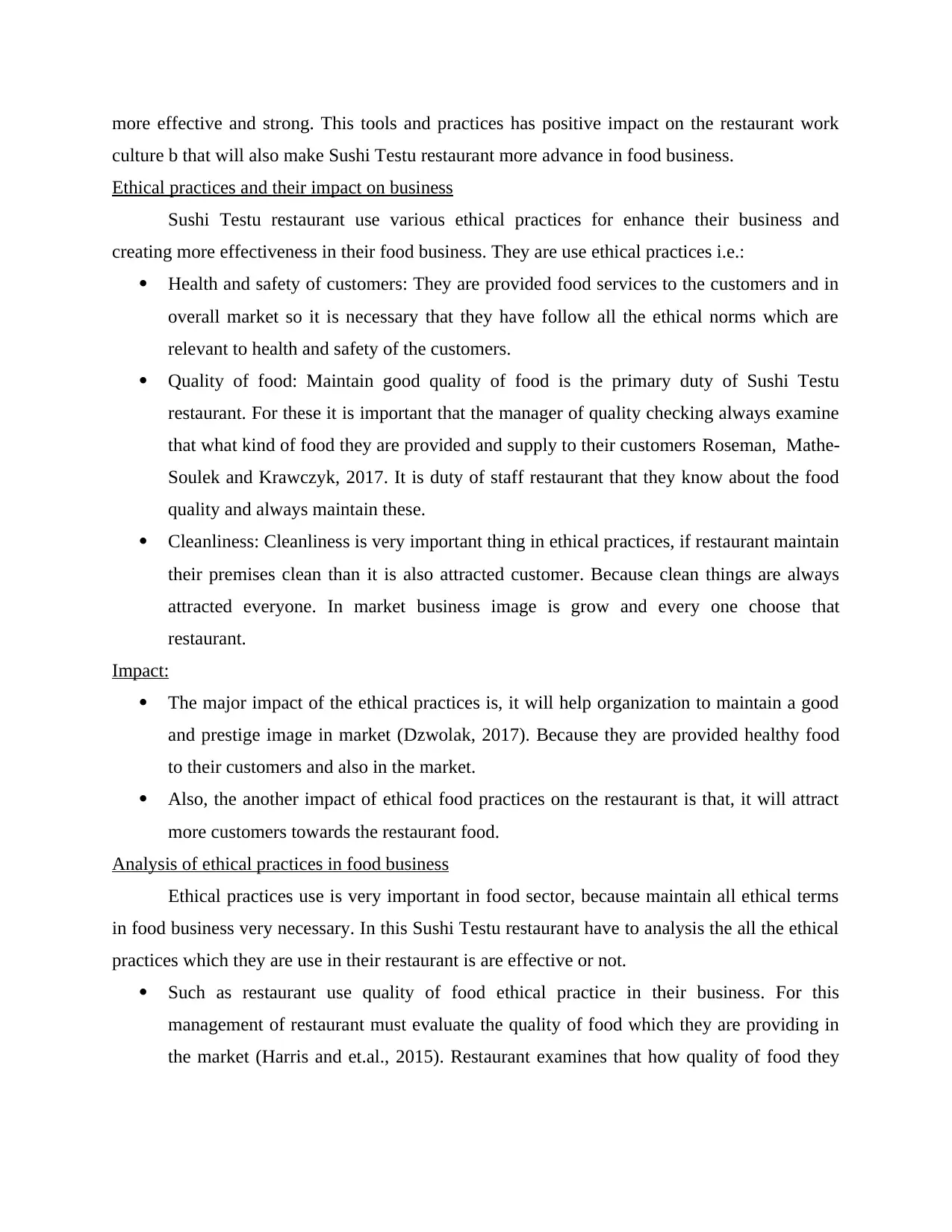
more effective and strong. This tools and practices has positive impact on the restaurant work
culture b that will also make Sushi Testu restaurant more advance in food business.
Ethical practices and their impact on business
Sushi Testu restaurant use various ethical practices for enhance their business and
creating more effectiveness in their food business. They are use ethical practices i.e.:
Health and safety of customers: They are provided food services to the customers and in
overall market so it is necessary that they have follow all the ethical norms which are
relevant to health and safety of the customers.
Quality of food: Maintain good quality of food is the primary duty of Sushi Testu
restaurant. For these it is important that the manager of quality checking always examine
that what kind of food they are provided and supply to their customers Roseman, Mathe-
Soulek and Krawczyk, 2017. It is duty of staff restaurant that they know about the food
quality and always maintain these.
Cleanliness: Cleanliness is very important thing in ethical practices, if restaurant maintain
their premises clean than it is also attracted customer. Because clean things are always
attracted everyone. In market business image is grow and every one choose that
restaurant.
Impact:
The major impact of the ethical practices is, it will help organization to maintain a good
and prestige image in market (Dzwolak, 2017). Because they are provided healthy food
to their customers and also in the market.
Also, the another impact of ethical food practices on the restaurant is that, it will attract
more customers towards the restaurant food.
Analysis of ethical practices in food business
Ethical practices use is very important in food sector, because maintain all ethical terms
in food business very necessary. In this Sushi Testu restaurant have to analysis the all the ethical
practices which they are use in their restaurant is are effective or not.
Such as restaurant use quality of food ethical practice in their business. For this
management of restaurant must evaluate the quality of food which they are providing in
the market (Harris and et.al., 2015). Restaurant examines that how quality of food they
culture b that will also make Sushi Testu restaurant more advance in food business.
Ethical practices and their impact on business
Sushi Testu restaurant use various ethical practices for enhance their business and
creating more effectiveness in their food business. They are use ethical practices i.e.:
Health and safety of customers: They are provided food services to the customers and in
overall market so it is necessary that they have follow all the ethical norms which are
relevant to health and safety of the customers.
Quality of food: Maintain good quality of food is the primary duty of Sushi Testu
restaurant. For these it is important that the manager of quality checking always examine
that what kind of food they are provided and supply to their customers Roseman, Mathe-
Soulek and Krawczyk, 2017. It is duty of staff restaurant that they know about the food
quality and always maintain these.
Cleanliness: Cleanliness is very important thing in ethical practices, if restaurant maintain
their premises clean than it is also attracted customer. Because clean things are always
attracted everyone. In market business image is grow and every one choose that
restaurant.
Impact:
The major impact of the ethical practices is, it will help organization to maintain a good
and prestige image in market (Dzwolak, 2017). Because they are provided healthy food
to their customers and also in the market.
Also, the another impact of ethical food practices on the restaurant is that, it will attract
more customers towards the restaurant food.
Analysis of ethical practices in food business
Ethical practices use is very important in food sector, because maintain all ethical terms
in food business very necessary. In this Sushi Testu restaurant have to analysis the all the ethical
practices which they are use in their restaurant is are effective or not.
Such as restaurant use quality of food ethical practice in their business. For this
management of restaurant must evaluate the quality of food which they are providing in
the market (Harris and et.al., 2015). Restaurant examines that how quality of food they
Paraphrase This Document
Need a fresh take? Get an instant paraphrase of this document with our AI Paraphraser
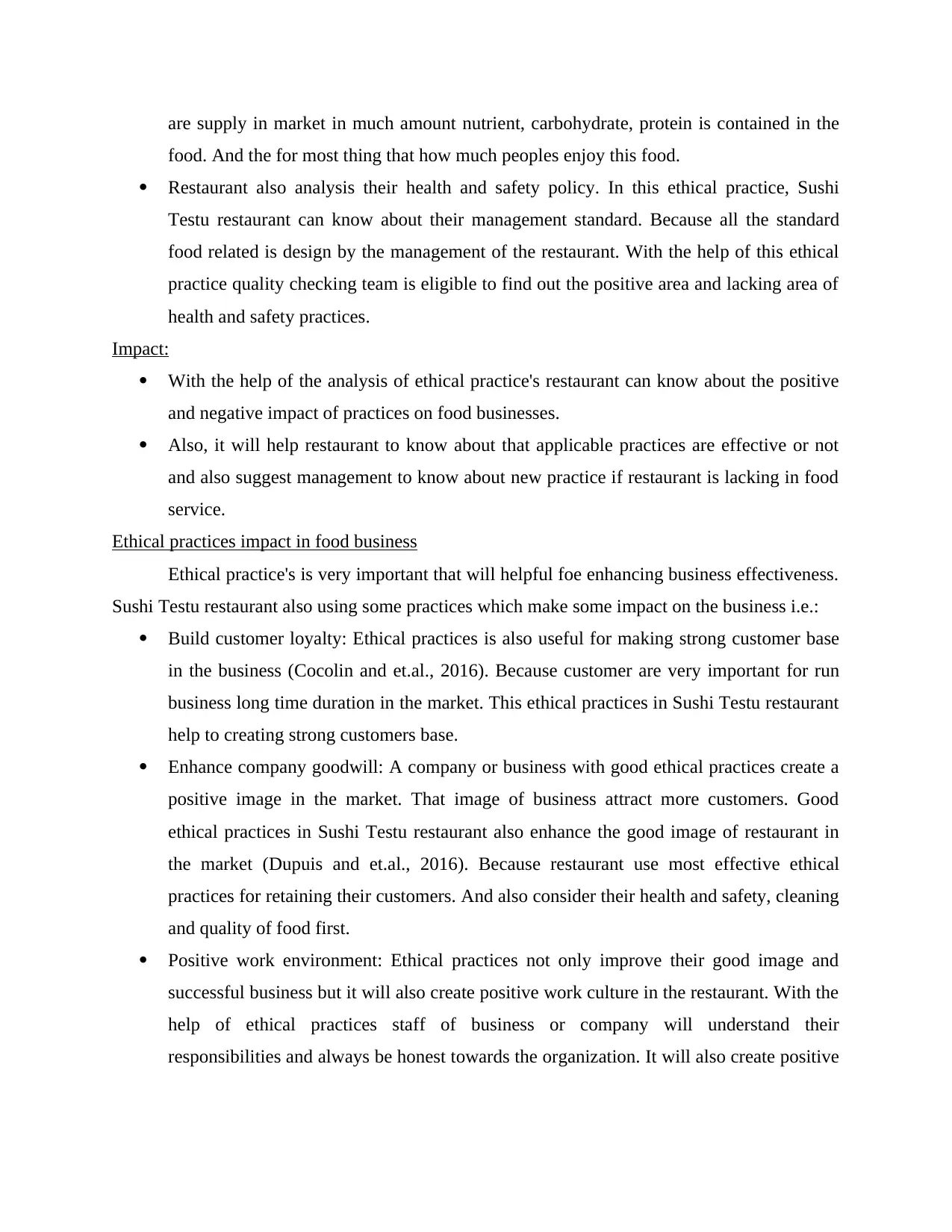
are supply in market in much amount nutrient, carbohydrate, protein is contained in the
food. And the for most thing that how much peoples enjoy this food.
Restaurant also analysis their health and safety policy. In this ethical practice, Sushi
Testu restaurant can know about their management standard. Because all the standard
food related is design by the management of the restaurant. With the help of this ethical
practice quality checking team is eligible to find out the positive area and lacking area of
health and safety practices.
Impact:
With the help of the analysis of ethical practice's restaurant can know about the positive
and negative impact of practices on food businesses.
Also, it will help restaurant to know about that applicable practices are effective or not
and also suggest management to know about new practice if restaurant is lacking in food
service.
Ethical practices impact in food business
Ethical practice's is very important that will helpful foe enhancing business effectiveness.
Sushi Testu restaurant also using some practices which make some impact on the business i.e.:
Build customer loyalty: Ethical practices is also useful for making strong customer base
in the business (Cocolin and et.al., 2016). Because customer are very important for run
business long time duration in the market. This ethical practices in Sushi Testu restaurant
help to creating strong customers base.
Enhance company goodwill: A company or business with good ethical practices create a
positive image in the market. That image of business attract more customers. Good
ethical practices in Sushi Testu restaurant also enhance the good image of restaurant in
the market (Dupuis and et.al., 2016). Because restaurant use most effective ethical
practices for retaining their customers. And also consider their health and safety, cleaning
and quality of food first.
Positive work environment: Ethical practices not only improve their good image and
successful business but it will also create positive work culture in the restaurant. With the
help of ethical practices staff of business or company will understand their
responsibilities and always be honest towards the organization. It will also create positive
food. And the for most thing that how much peoples enjoy this food.
Restaurant also analysis their health and safety policy. In this ethical practice, Sushi
Testu restaurant can know about their management standard. Because all the standard
food related is design by the management of the restaurant. With the help of this ethical
practice quality checking team is eligible to find out the positive area and lacking area of
health and safety practices.
Impact:
With the help of the analysis of ethical practice's restaurant can know about the positive
and negative impact of practices on food businesses.
Also, it will help restaurant to know about that applicable practices are effective or not
and also suggest management to know about new practice if restaurant is lacking in food
service.
Ethical practices impact in food business
Ethical practice's is very important that will helpful foe enhancing business effectiveness.
Sushi Testu restaurant also using some practices which make some impact on the business i.e.:
Build customer loyalty: Ethical practices is also useful for making strong customer base
in the business (Cocolin and et.al., 2016). Because customer are very important for run
business long time duration in the market. This ethical practices in Sushi Testu restaurant
help to creating strong customers base.
Enhance company goodwill: A company or business with good ethical practices create a
positive image in the market. That image of business attract more customers. Good
ethical practices in Sushi Testu restaurant also enhance the good image of restaurant in
the market (Dupuis and et.al., 2016). Because restaurant use most effective ethical
practices for retaining their customers. And also consider their health and safety, cleaning
and quality of food first.
Positive work environment: Ethical practices not only improve their good image and
successful business but it will also create positive work culture in the restaurant. With the
help of ethical practices staff of business or company will understand their
responsibilities and always be honest towards the organization. It will also create positive
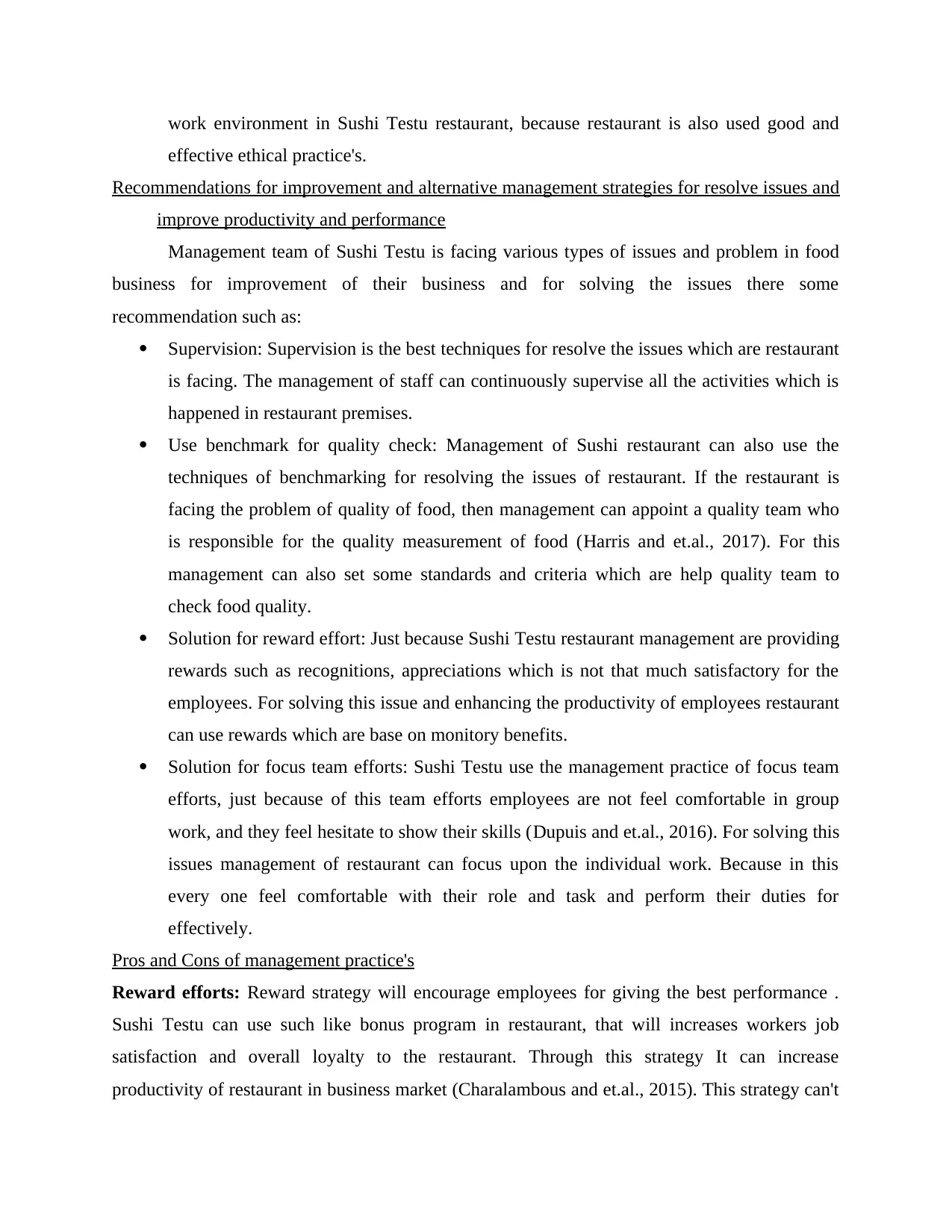
work environment in Sushi Testu restaurant, because restaurant is also used good and
effective ethical practice's.
Recommendations for improvement and alternative management strategies for resolve issues and
improve productivity and performance
Management team of Sushi Testu is facing various types of issues and problem in food
business for improvement of their business and for solving the issues there some
recommendation such as:
Supervision: Supervision is the best techniques for resolve the issues which are restaurant
is facing. The management of staff can continuously supervise all the activities which is
happened in restaurant premises.
Use benchmark for quality check: Management of Sushi restaurant can also use the
techniques of benchmarking for resolving the issues of restaurant. If the restaurant is
facing the problem of quality of food, then management can appoint a quality team who
is responsible for the quality measurement of food (Harris and et.al., 2017). For this
management can also set some standards and criteria which are help quality team to
check food quality.
Solution for reward effort: Just because Sushi Testu restaurant management are providing
rewards such as recognitions, appreciations which is not that much satisfactory for the
employees. For solving this issue and enhancing the productivity of employees restaurant
can use rewards which are base on monitory benefits.
Solution for focus team efforts: Sushi Testu use the management practice of focus team
efforts, just because of this team efforts employees are not feel comfortable in group
work, and they feel hesitate to show their skills (Dupuis and et.al., 2016). For solving this
issues management of restaurant can focus upon the individual work. Because in this
every one feel comfortable with their role and task and perform their duties for
effectively.
Pros and Cons of management practice's
Reward efforts: Reward strategy will encourage employees for giving the best performance .
Sushi Testu can use such like bonus program in restaurant, that will increases workers job
satisfaction and overall loyalty to the restaurant. Through this strategy It can increase
productivity of restaurant in business market (Charalambous and et.al., 2015). This strategy can't
effective ethical practice's.
Recommendations for improvement and alternative management strategies for resolve issues and
improve productivity and performance
Management team of Sushi Testu is facing various types of issues and problem in food
business for improvement of their business and for solving the issues there some
recommendation such as:
Supervision: Supervision is the best techniques for resolve the issues which are restaurant
is facing. The management of staff can continuously supervise all the activities which is
happened in restaurant premises.
Use benchmark for quality check: Management of Sushi restaurant can also use the
techniques of benchmarking for resolving the issues of restaurant. If the restaurant is
facing the problem of quality of food, then management can appoint a quality team who
is responsible for the quality measurement of food (Harris and et.al., 2017). For this
management can also set some standards and criteria which are help quality team to
check food quality.
Solution for reward effort: Just because Sushi Testu restaurant management are providing
rewards such as recognitions, appreciations which is not that much satisfactory for the
employees. For solving this issue and enhancing the productivity of employees restaurant
can use rewards which are base on monitory benefits.
Solution for focus team efforts: Sushi Testu use the management practice of focus team
efforts, just because of this team efforts employees are not feel comfortable in group
work, and they feel hesitate to show their skills (Dupuis and et.al., 2016). For solving this
issues management of restaurant can focus upon the individual work. Because in this
every one feel comfortable with their role and task and perform their duties for
effectively.
Pros and Cons of management practice's
Reward efforts: Reward strategy will encourage employees for giving the best performance .
Sushi Testu can use such like bonus program in restaurant, that will increases workers job
satisfaction and overall loyalty to the restaurant. Through this strategy It can increase
productivity of restaurant in business market (Charalambous and et.al., 2015). This strategy can't
⊘ This is a preview!⊘
Do you want full access?
Subscribe today to unlock all pages.

Trusted by 1+ million students worldwide
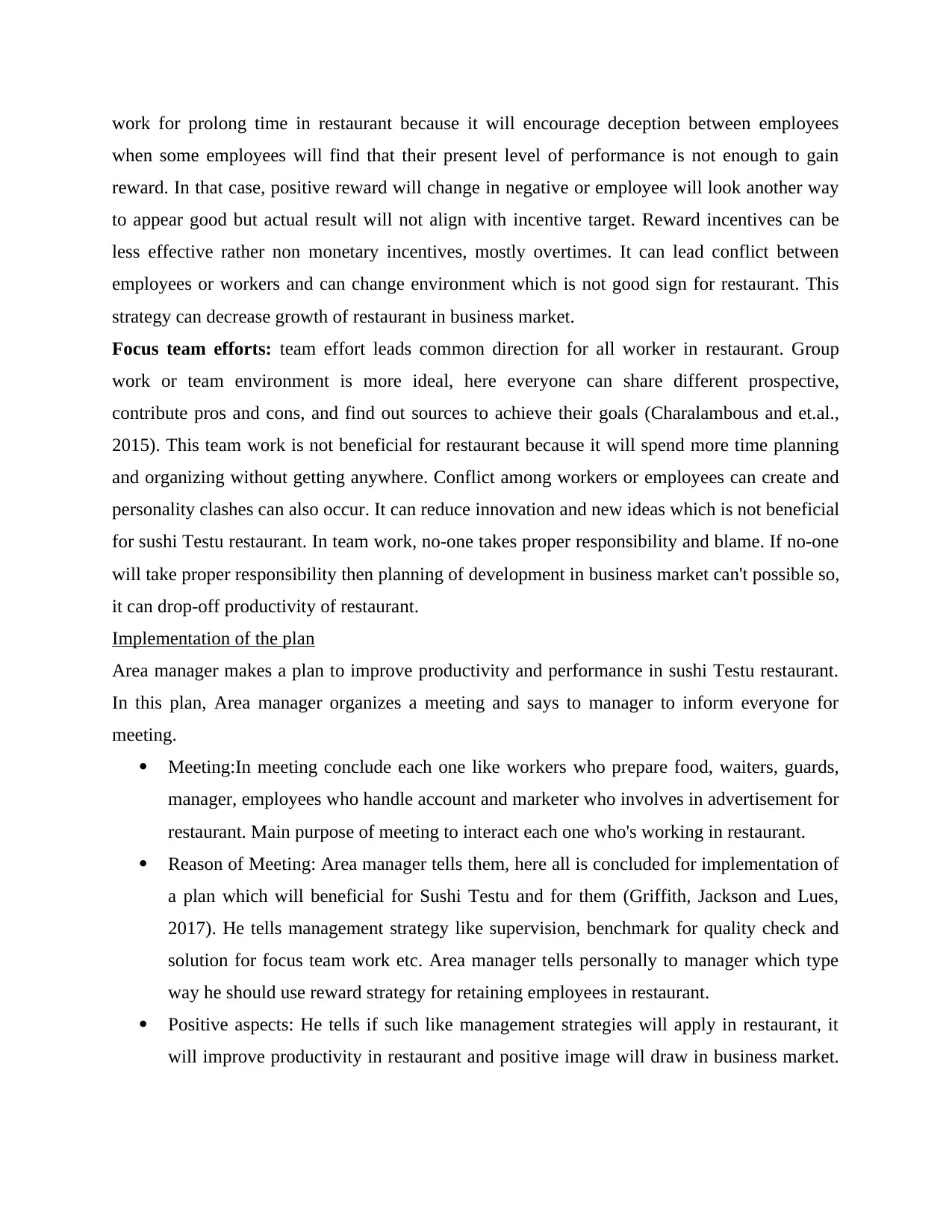
work for prolong time in restaurant because it will encourage deception between employees
when some employees will find that their present level of performance is not enough to gain
reward. In that case, positive reward will change in negative or employee will look another way
to appear good but actual result will not align with incentive target. Reward incentives can be
less effective rather non monetary incentives, mostly overtimes. It can lead conflict between
employees or workers and can change environment which is not good sign for restaurant. This
strategy can decrease growth of restaurant in business market.
Focus team efforts: team effort leads common direction for all worker in restaurant. Group
work or team environment is more ideal, here everyone can share different prospective,
contribute pros and cons, and find out sources to achieve their goals (Charalambous and et.al.,
2015). This team work is not beneficial for restaurant because it will spend more time planning
and organizing without getting anywhere. Conflict among workers or employees can create and
personality clashes can also occur. It can reduce innovation and new ideas which is not beneficial
for sushi Testu restaurant. In team work, no-one takes proper responsibility and blame. If no-one
will take proper responsibility then planning of development in business market can't possible so,
it can drop-off productivity of restaurant.
Implementation of the plan
Area manager makes a plan to improve productivity and performance in sushi Testu restaurant.
In this plan, Area manager organizes a meeting and says to manager to inform everyone for
meeting.
Meeting:In meeting conclude each one like workers who prepare food, waiters, guards,
manager, employees who handle account and marketer who involves in advertisement for
restaurant. Main purpose of meeting to interact each one who's working in restaurant.
Reason of Meeting: Area manager tells them, here all is concluded for implementation of
a plan which will beneficial for Sushi Testu and for them (Griffith, Jackson and Lues,
2017). He tells management strategy like supervision, benchmark for quality check and
solution for focus team work etc. Area manager tells personally to manager which type
way he should use reward strategy for retaining employees in restaurant.
Positive aspects: He tells if such like management strategies will apply in restaurant, it
will improve productivity in restaurant and positive image will draw in business market.
when some employees will find that their present level of performance is not enough to gain
reward. In that case, positive reward will change in negative or employee will look another way
to appear good but actual result will not align with incentive target. Reward incentives can be
less effective rather non monetary incentives, mostly overtimes. It can lead conflict between
employees or workers and can change environment which is not good sign for restaurant. This
strategy can decrease growth of restaurant in business market.
Focus team efforts: team effort leads common direction for all worker in restaurant. Group
work or team environment is more ideal, here everyone can share different prospective,
contribute pros and cons, and find out sources to achieve their goals (Charalambous and et.al.,
2015). This team work is not beneficial for restaurant because it will spend more time planning
and organizing without getting anywhere. Conflict among workers or employees can create and
personality clashes can also occur. It can reduce innovation and new ideas which is not beneficial
for sushi Testu restaurant. In team work, no-one takes proper responsibility and blame. If no-one
will take proper responsibility then planning of development in business market can't possible so,
it can drop-off productivity of restaurant.
Implementation of the plan
Area manager makes a plan to improve productivity and performance in sushi Testu restaurant.
In this plan, Area manager organizes a meeting and says to manager to inform everyone for
meeting.
Meeting:In meeting conclude each one like workers who prepare food, waiters, guards,
manager, employees who handle account and marketer who involves in advertisement for
restaurant. Main purpose of meeting to interact each one who's working in restaurant.
Reason of Meeting: Area manager tells them, here all is concluded for implementation of
a plan which will beneficial for Sushi Testu and for them (Griffith, Jackson and Lues,
2017). He tells management strategy like supervision, benchmark for quality check and
solution for focus team work etc. Area manager tells personally to manager which type
way he should use reward strategy for retaining employees in restaurant.
Positive aspects: He tells if such like management strategies will apply in restaurant, it
will improve productivity in restaurant and positive image will draw in business market.
Paraphrase This Document
Need a fresh take? Get an instant paraphrase of this document with our AI Paraphraser
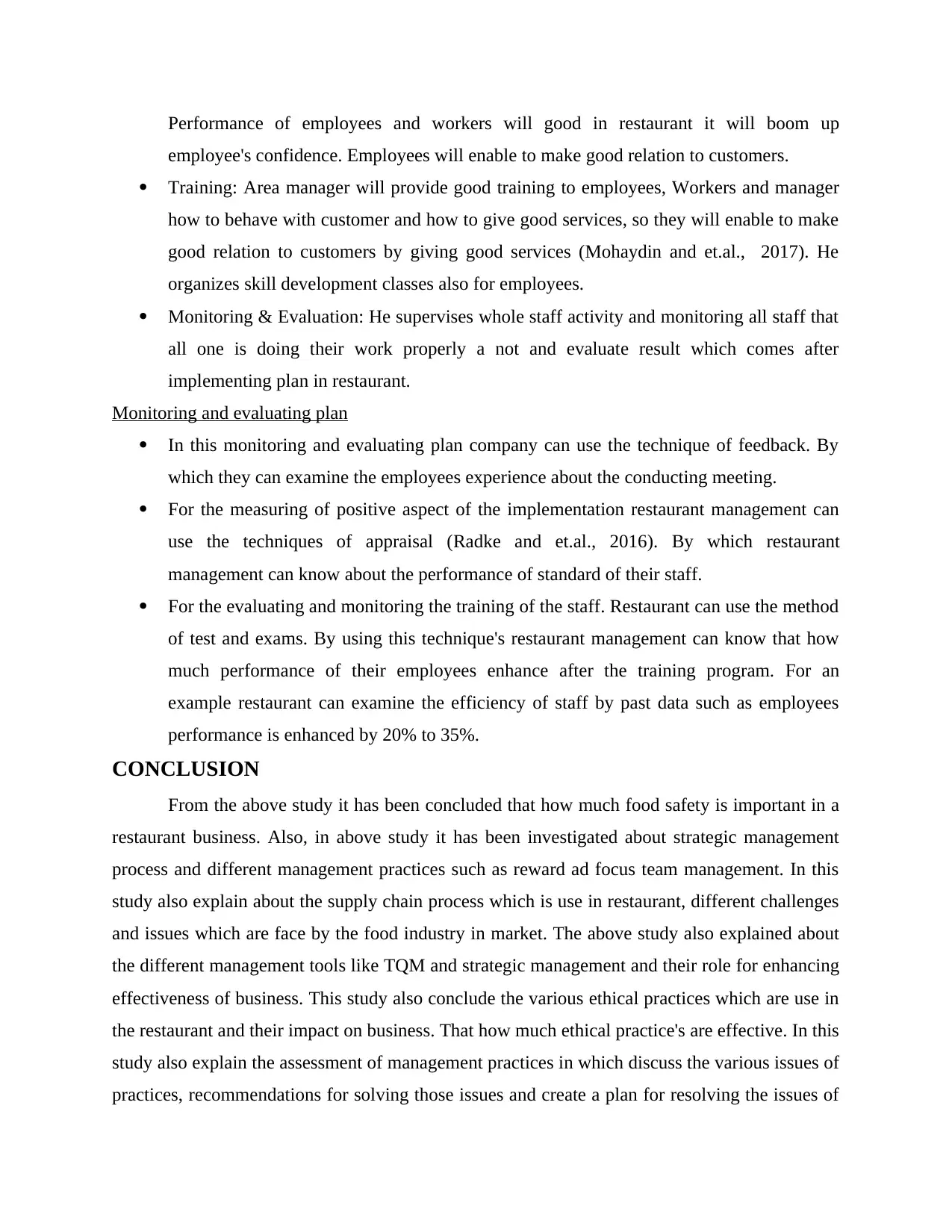
Performance of employees and workers will good in restaurant it will boom up
employee's confidence. Employees will enable to make good relation to customers.
Training: Area manager will provide good training to employees, Workers and manager
how to behave with customer and how to give good services, so they will enable to make
good relation to customers by giving good services (Mohaydin and et.al., 2017). He
organizes skill development classes also for employees.
Monitoring & Evaluation: He supervises whole staff activity and monitoring all staff that
all one is doing their work properly a not and evaluate result which comes after
implementing plan in restaurant.
Monitoring and evaluating plan
In this monitoring and evaluating plan company can use the technique of feedback. By
which they can examine the employees experience about the conducting meeting.
For the measuring of positive aspect of the implementation restaurant management can
use the techniques of appraisal (Radke and et.al., 2016). By which restaurant
management can know about the performance of standard of their staff.
For the evaluating and monitoring the training of the staff. Restaurant can use the method
of test and exams. By using this technique's restaurant management can know that how
much performance of their employees enhance after the training program. For an
example restaurant can examine the efficiency of staff by past data such as employees
performance is enhanced by 20% to 35%.
CONCLUSION
From the above study it has been concluded that how much food safety is important in a
restaurant business. Also, in above study it has been investigated about strategic management
process and different management practices such as reward ad focus team management. In this
study also explain about the supply chain process which is use in restaurant, different challenges
and issues which are face by the food industry in market. The above study also explained about
the different management tools like TQM and strategic management and their role for enhancing
effectiveness of business. This study also conclude the various ethical practices which are use in
the restaurant and their impact on business. That how much ethical practice's are effective. In this
study also explain the assessment of management practices in which discuss the various issues of
practices, recommendations for solving those issues and create a plan for resolving the issues of
employee's confidence. Employees will enable to make good relation to customers.
Training: Area manager will provide good training to employees, Workers and manager
how to behave with customer and how to give good services, so they will enable to make
good relation to customers by giving good services (Mohaydin and et.al., 2017). He
organizes skill development classes also for employees.
Monitoring & Evaluation: He supervises whole staff activity and monitoring all staff that
all one is doing their work properly a not and evaluate result which comes after
implementing plan in restaurant.
Monitoring and evaluating plan
In this monitoring and evaluating plan company can use the technique of feedback. By
which they can examine the employees experience about the conducting meeting.
For the measuring of positive aspect of the implementation restaurant management can
use the techniques of appraisal (Radke and et.al., 2016). By which restaurant
management can know about the performance of standard of their staff.
For the evaluating and monitoring the training of the staff. Restaurant can use the method
of test and exams. By using this technique's restaurant management can know that how
much performance of their employees enhance after the training program. For an
example restaurant can examine the efficiency of staff by past data such as employees
performance is enhanced by 20% to 35%.
CONCLUSION
From the above study it has been concluded that how much food safety is important in a
restaurant business. Also, in above study it has been investigated about strategic management
process and different management practices such as reward ad focus team management. In this
study also explain about the supply chain process which is use in restaurant, different challenges
and issues which are face by the food industry in market. The above study also explained about
the different management tools like TQM and strategic management and their role for enhancing
effectiveness of business. This study also conclude the various ethical practices which are use in
the restaurant and their impact on business. That how much ethical practice's are effective. In this
study also explain the assessment of management practices in which discuss the various issues of
practices, recommendations for solving those issues and create a plan for resolving the issues of

management practices in the food business. In the end of study it has been included monitoring
and evaluating plan for examine the effectiveness of plan of solving issues.
and evaluating plan for examine the effectiveness of plan of solving issues.
⊘ This is a preview!⊘
Do you want full access?
Subscribe today to unlock all pages.

Trusted by 1+ million students worldwide
1 out of 18
Related Documents
Your All-in-One AI-Powered Toolkit for Academic Success.
+13062052269
info@desklib.com
Available 24*7 on WhatsApp / Email
![[object Object]](/_next/static/media/star-bottom.7253800d.svg)
Unlock your academic potential
Copyright © 2020–2026 A2Z Services. All Rights Reserved. Developed and managed by ZUCOL.





